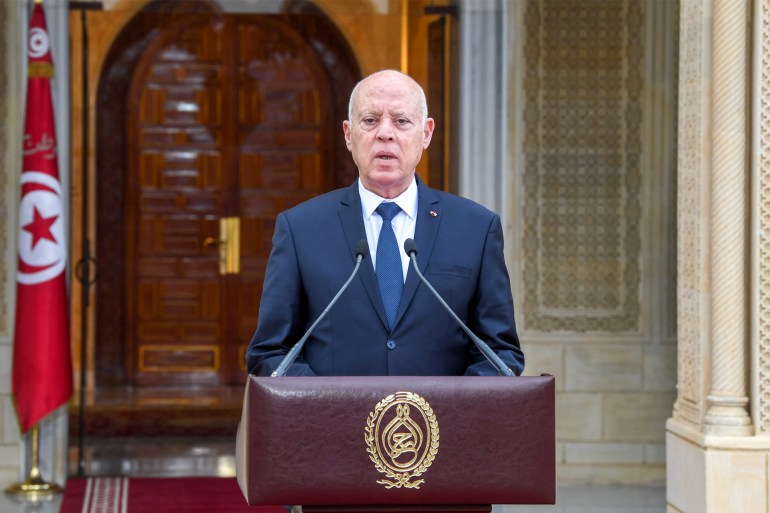Several political parties in Tunisia denounced what they described as President Kais Saied's uniqueness of the decision and its exclusion from the national dialogue, and called for confronting what they described as a farce.
The National Salvation Front, which includes a number of Tunisian parties, including the Ennahda party and the "Citizens Against the Coup" campaign, denounced what was stated in the decree of President Kais Saied, and denounced the enactment of an alternative constitution outside the legal and constitutional frameworks, without consultation with the country's social and political bodies.
The Front considered - in a statement - that the work of the preparatory body for the referendum to be held next July 25, which was formed by President Saeed, is null and without legal effect.
She said that the referendum was based on an electronic consultation, which was boycotted by more than 95% of voters.
The statement called on what it called the national forces to defend democracy and freedoms in order to return to constitutional legitimacy and the separation of powers.
She called on all living forces clinging to the democratic path, including political parties, civil society organizations and national figures, to "confront this farce and overthrow the path of the coup against the constitution."
On Friday, Tunisian President Kais Saied issued a presidential decree to form a national advisory body for a new republic, two advisory committees and another for national dialogue, and all political parties were excluded from its membership.
Brigadier General Sadek Belaid was assigned to head the National Consultative Commission for a New Republic, a body charged with the new constitution.
At the request of the President of the Republic, the National Consultative Commission shall submit proposals related to the preparation of a draft constitution for a new republic.
The Commission consists of 3 committees: the Economic and Social Committee, the Legal Committee and the National Dialogue.
The commission is headed by a president called the coordinating chair, and its members are obligated to preserve the secrecy of deliberations, provided that all its work ends on the 20th of the next month.
Saeed, Friday, issued a decree to form the National Consultative Commission for a new republic (communication sites)
Reject other parties
For its part, the Coordination of Social Democratic Parties in Tunisia denounced today, Saturday, the exclusion of political parties from the national dialogue announced by President Kais Saied.
The Coordination of Parties, which includes the Democratic Current, the Republican Party, and the Bloc for Work and Freedoms, expressed its rejection of "the direction desired by the head of the de-facto authority, Qais Saeed, through which he pushed the country towards a path that dwarfs society, eliminates the role of political parties, marginalizes civil society organizations and makes them A false witness to the drafting of a constitution that was written in closed rooms.
She called on all national parties, especially national organizations, to refuse to participate in the so-called dialogue committee, and to assume the legal responsibilities of all those who accept to engage in the coup d'état.
In this context, a spokesman for the Tunisian General Labor Union, Sami Tahri, said that the union will hold a meeting of its administrative body next Monday with the aim of determining its position on the presidential decree regarding the formation of a national advisory body for a new republic, stressing that the union has not announced an official position until now regarding this decree.
In a statement to the Tunisian News Agency, Al-Tahri explained that the position reported by the media in conjunction with the issuance of the presidential decree is not an official position of the trade union organization, but rather statements by one of the electronic newspapers prior to its issuance.
Al-Tahri affirmed the union's adherence to the same conditions that it had previously put forward, most notably the need for the dialogue to be open to the participation of national parties and organizations and not based on previous and conditional results, as he put it.
The Tunisian General Labor Union, which has a wide influence, responded yesterday, Friday, after the issuance of the decree, by saying that the dialogue proposed by President Kais Saied in this way is rejected.
In mid-January, Saeed announced the launch of a national consultation via an electronic platform, with the aim of enhancing citizens' participation in the democratic transition process, followed by a popular referendum next July to determine the political system and the electoral system scheduled for next December.
Since last July 25, Tunisia has been witnessing a severe political crisis, at which time Saied began imposing exceptional measures, including freezing the competencies of Parliament, issuing legislation by presidential decrees, dismissing the government and appointing new ones.
Most of the political and civil forces in Tunisia reject these measures, and consider them a coup against the constitution.

